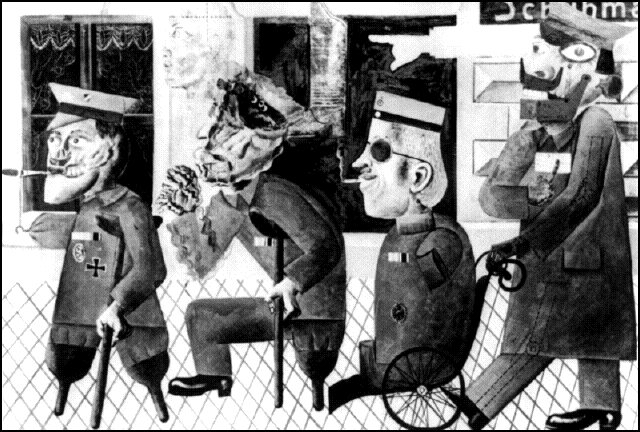
FIFTEEN
INSURMOUNTABLE
PARADOXESEach of the 200 issues of this magazine carry a "Paradox of the Month" --- one of those questions or statements that makes no sense at all if, unless, it is not already also an all-encompassing answer to the puzzlements of everything possible.
We present here fifteen of our favorites from over the years.
Civilization and BarbarismCivilization brings religion, science, philosophy, art, and a social order that allows individuals the freedom, security and leisure to explore ideas and means of self-expression. Barbarism means violence, triviality, lies --- all the base values that pervert and eventually destroy the work of civilization.

But because civilization must incorporate certain elements of barbarism to maintain and defend itself --- armies, police, the state --- it is eventually overrun by these and finds itself more and more motivated by the values of barbarism, rather than its own values.--- From In Search of P. D. Ouspensky:
The Genius in the Shadow of Gurdjieff
Gary Lachman
©2004 Quest BooksThe Useful RacketHe is prepared to admit uncomfortable truths. He makes clear that mobs, mafias and global rackets are often performing useful and occasionally vital social functions that no other institution --- governments, legal systems, the police, the economy itself --- is capable of providing.It is usually assumed that organized crime is a network of unqualified evil: murderous, recklessly greedy, the enemy of all human values and all hopes for better lives. Glenny's book is a warning against such a simple view. No, big gangsters are not nice people, they get what they want through the threat of ultimate use of violence and blackmail. And it's obvious that their operations can wreck the lives of millions through addiction or --- as in the Balkans or Columbia --- through the equipping and financing of local wars.
But are the mobs and mafias really Public Enemy Number One? It would be shrewder to call them Government Enemy Number One: they are formations that deprive a state of revenue, of the monopoly of violence and law enforcement, and sometimes of international respect. The public, by contrast, may find them less dreadful --- often, in fact, less dreadful than the governments that are supposed to be serving and protecting their citizens.--- Neal Ascherson
Review of
McMafia: Crime Without Frontiers
Misha Glenny
(Bodley Head)
The Right TrackEven if you're on the right track... ...you'll get run over if you just sit there.--- Will Rogers, as quoted in
...you'll get run over if you just sit there.--- Will Rogers, as quoted in
The Boy Who Invented
Television
(TeamCom)Happiness
and/or
Being at Peace"Happiness is one thing and being at peace another. Sometimes we have to give up on happiness in order to be able to go on living. You see?"Traúm stopped for a moment. "That's what being a Jew is for me --- knowing that life is more important than happiness."
--- From Three Musketeers
Marcelo Birmajer
Sharon Wood, Translator
©2008 The Toby PressLet There Be LightAt first there was nothing. Then God said,"Let there be light."
Then there was still nothing ---
but you could see it.--- From Rock Gardening in
the UkraineThe Question of
Life and DeathJohn Daido Loori was a monk at the Los Angeles Zen Center. One day he said to Maezumi Roshi: "I have resolved the question of life and death."
Maezumi: "Are you sure?"
Loori: "Yes."
Maezumi: "Are you really sure?"
Loori: "Absolutely."
Maezumi threw himself violently upon Loori and began to strangle him. Loori struggled to escape, but to no avail. Finally he swung back his fist and struck his teacher, knocking him aside.
Maezumi rose to his feet and brushed himself off. "Resolved the question of life and death, eh?" he said, and walked off.Later, Loori passed a senior monk, Genpo Sensei. Sensei saw the marks of his teacher's fingers on Loori's throat.
"Told Roshi you'd resolved the question of life and death, did you?" he said.--- From One Bird, One Stone
108 American Zen Stories
©2002Renaissance Books
Reprinted in The Sun Magazine
Phillip the Innocent's HeartPhillip the Innocent was responsible for the death of some 15,000 opponents at the Massacre of Deuxchamps, in 1259. His method of dispatching the opponents was so virulent and brutal that the word "Deuxchamps," for years, was the word in French equal to "horror" and "bloody nightmare."When Phillip the Innocent died towards the end of the thirteenth century, it was found that his heart was no larger than the heart of a wren.--- French Politics
Before the Renaissance
P. N. LipschitzOn Getting OlderThe tiresome thing about getting older is that you hear and read the same things over again. Stuff you know already is given out as news. The young discover global capitalism, sexual freedom, social restraints, and the old discover that they are bored, opening newspapers to read articles they read thirty years ago, listening to revelations that were new to them decades past. And on and on.So we turn on ourselves, like our parents' generation did and mutter about the banality of movies, TV programs, magazines. We begin to decide that these things aren't made for us, and instead of trying to find a way to engage with and exchange ideas outside our own generation, we start to write memoirs like retired generals from some long forgotten war, or decide that it's just as well we're old because the world had failed to understand what we have done for it and it is no longer good enough for us.
--- Jenni Diski in
The London Review of Books,
6 July 2000Gandhi and HollywoodEverybody in Hollywood wants to be just like Gandhi.Thin, tan, and immortal.--- Martin SheenLearning to Love Dick CheneyNew York Times: What do you think about when you meditate?
Robert Thurman: Usually, some form of trying to excavate any kind of negative thing cycling in the mind and turn it toward the positive. For example, when I am annoyed with Dick Cheney, I meditate on how Dick Cheney was my mother in a previous life and nursed me at his breast.New York Times: You mean you fantasize about being breast-fed by Dick Cheney?
Robert Thurman: It's a fantasy of releasing fear and developing affection. It's a way of coming back to feeling grateful toward him and seeing his positive side, finding the mother in Dick Cheney.
New York Times: What would Freud say about that?
Robert Thurman: Freud would freak out. He would say, "Well, you are seeking the oceanic feeling of the baby in the womb." Infantile regression --- that's what he thought the quest for enlightenment was.--- From an Interview with Robert Thurman,
The New York Times Magazine
29 June 2008
The BombToday, at the end of the neolithic age, we have the Bomb as environment. The Bomb is not a gimmick or a gadget. It is not something that has been inserted in the military establishment more than automation is something that is now being inserted into the industrial establishment. The Bomb, like automation, is a new environment consisting of a network of information and feedback loops.The Bomb, as pure information, consists of higher learning. It is, as it were, the extension division of the modern university in its highest research areas, creating a very tight environment indeed.--- From Understanding Me:
Lectures and Interviews
Marshall McLuhan
©2005, MIT PressThe Original SoundI asked an old monk,
"How long have you been here?"
"Forever," he answered.
I smiled, "Fifty years, Father?"
"Forever."
"Did you know St. Benedict?"
"We were novices together."
"Did you know Jesus?"
"He and I converse every day."
I threw away my silly smile, fell to my knees, and clutched his hand.
"Father," I whispered," Did you hear the original sound?"
"I am listening to the original sound."--- Tales of a Magic Monastery
Theophane the Monk
(Crossroads)Death Rates:
Abortion Vs. Normal ChildbirthIn the U. S., the fatality risk with mifepristone [RU-486] is slightly less than 1 per 100,000 cases, compared with 0.1 per 100,000 for surgical abortion at eight weeks or less.Pregnancy itself carries a fatality rate of 11.8 per 100,000.--- Consumer Reports
February 2005
Getting the Light"I want to join the community and work to attain enlightenment. How long will it take me?"
"Ten years," replies the master.
"Well, how about if I really work and double my efforts?"
"Twenty years."
"Hey, just a moment. That's not fair! Why did you double it?"
"In your case," says the master, "I'm afraid it will be thirty years."--- Jack Kornfeld, in
After the Ecstasy,
the Laundry.EternityEternity is in Love......with the production of time.--- William Blake,
The Marriage of Heaven and Hell